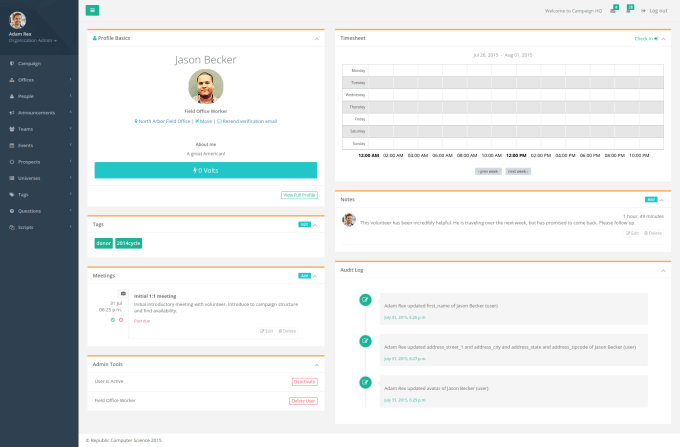Software is eating the world, and it is continuing its monstrous diet in politics. The traditional shoe leather approach of political campaigning has been replaced by rooms of engineers, AWS instances, and data science APIs designed to maximize votes for the lowest cost. Your “gut” need not apply.
The fight for tech supremacy in politics has not been an even fight, with Democrats (and particularly the two Obama presidential campaigns) trouncing Republicans in product and engineering sophistication. The Obama campaign’s acumen around analytics became the subject of a popular book on the new science of campaigns, while Romney’s 2012 campaign was widely derided for the clumsy rollout of its Orca app for campaign workers.
Now, a new group of Republican engineers, learning from the mistakes of the past few election cycles, hope they have developed the platform needed for the GOP to compete with Democrats and retake the White House in 2016.
Republic Computer Science is launching Republic VX, a new campaign management platform for Republican candidates. The product is designed to assist managers with all the key areas of modern campaigning, including volunteer management, staff organization, and voter turnout.
The team was founded by Azarias Reda, a PhD holder in Computer Science who also dual hats as the CTO of the Republican National Committee. He joined the RNC in late 2013 to lead the RNC’s data team, and he also devised the party’s startup incubator known as Para Bellum Labs.
Identity + Activities = Victory
Reda described the dual nature of software required for political campaigns. On one hand, you need what he calls an identity layer (Google+ lives on!) to identify volunteers and provide them goals to make a campaign successful.
The challenge is that this identity information can often be siloed in databases held by the national party headquarters. “The RNC has been great about collecting data for a long time, but how do we get that back into the field?” Reda explained.
Once that identity layer is in place, campaigns need an activity layer to actually organize people for electoral success. In the past two presidential elections, this was the largest gap between the Democratic and Republican parties. Obama’s campaigns were not just successful because they had so many volunteers, but also because they were able to transform those volunteers into effective vote-getting machines.
Building A Next Generation Campaign Platform
Republic VX is an attempt to start building the product that will “couple this identity layer with this activity layer” as Reda put it. Building on top of established web tools like Python’s Django library, the team has created essentially a customized and intelligent CRM product designed from the ground up for campaign managers.
The top priority for the product is helping campaigns manage all of their local offices. While presidential campaigns are national in scope, the actual work and organizing efforts happen at dozens of local field offices throughout the United States. Republic wants to ensure that each office not only has the best tools to manage volunteers, but also can interact with their peers throughout the nation.

Republic has designed new tools to better track volunteers
In addition to office management, the new platform attempts to provide better access to the RNC’s extensive databases. One conclusion from the party’s postmortem following the 2012 campaign was that the Republicans had plenty of data available, but that access to that data was limited for local campaigners who needed it most. “There was a lot of data that was already collected, and the failures happened at the applications layer,” Reda explained.
In this early build of Republic, that sort of access has been given extensive attention by the engineering team. Adding potential new volunteer leads is significantly easier than before, and the platform also integrates with the RNC’s data APIs to allow campaigns to quickly understand a person’s full voter history. Campaigns can now respond to volunteer interest in real-time.
However, there are two key challenges around the product and its data. One is ensuring that field offices can only view data to which they have been granted access to. Reda and his team wants the product to ensure that it “enforces that relationship so that the field officer in Ohio can’t see the data from Florida.”
The second problem is around siloing data across different campaigns. With 16 candidates currently seeking the Republican Party’s nomination for president, Republic has had to ensure that volunteer and voter data is properly isolated between the campaigns. The platform was “designed as a multi-tenant web sever with a single-tenant database,” according to Reda in order to be efficient with resources while also offering each campaign a secure environment to run for office.
Iterating To The Presidency
Perhaps Republic’s biggest innovation is simply following the Silicon Valley mantra of iterate, iterate, iterate. The company is trying to learn from the mistakes of Romney’s 2012 bid for the White House, where the campaign’s notorious Orca app failed on election day since it never went through an extensive beta testing.
The new approach is to ensure that features are fully baked before developing others. Reda says that “What we have tried to do is to do something on a limited scope but to do it well. We are pilot testing with the RNC now, and we want to get the basics right.”
Today that means the identity layer, with the activity layer getting more attention as the platform develops. The team is also experimenting with new concepts like Vols – volunteer points that could be exchanged for campaign swag or dinner with a candidate.
Reda is hopeful that this tool could form the backbone for the campaign of the future Republican presidential nominee, whoever he or she is. “I don’t know why this didn’t exist before, since the field program and ground campaign is a key component of campaigns.” 2016 will show whether tech’s role in politics remains a decidedly left-wing affair, or whether Republicans can close the distance.
